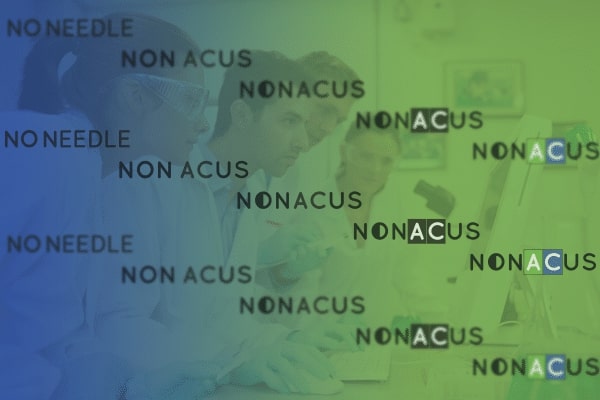December 18, 2020 | COMPANY
Nonacus. The name behind non-invasive genomic diagnostics
When Chris and Lee founded Nonacus in 2015 they had one singular purpose - to develop non-invasive DNA tests that would change the way genomic diagnostics was done.
Choosing a name that would reflect this mission wasn't easy.
Based off the Latin term 'non acus' meaning 'no needle', Nonacus accurately symbolises the company's mission- to move away from intrusive, risky diagnostic procedures like tissue biopsies or amniocentesis towards less invasive testing. With the ultimate aim to not only improve patients experience and care but open up new possibilities for monitoring and treatment.

Replacing invasive techniques with non-invasive genetic testing
Advances in Next Generation Sequencing (NGS) technologies and the introduction of cell free DNA (cfDNA) testing has prompted a revolution in genetic diagnostics. This is evident in the areas of oncology and prenatal genetics where a simple blood or urine test has the potential to replace invasive procedures like biopsies or amniocentesis.
The analysis of cell free DNA for disease-causing mutations in blood, saliva, urine or other bodily fluids enables healthcare professionals to obtain critical genetic information. This provides a better understanding of a patient's individual condition, and consequently a more personalised diagnosis and subsequent treatment plan. All whilst alleviating the amount of discomfort faced by the patient.
Non-invasive testing for bladder cancer
A good example is bladder cancer: the first step in diagnosis is a cystoscopy, an invasive procedure allowing a specialist to examine the inside of the bladder. If abnormalities are found, a biopsy of the lining is taken and checked for cancer cells. Of the >100,000 cystoscopies done in the UK alone each year, only 10% will actually have cancer. This leads to a large number of invasive, expensive, and ultimately unnecessary tests. Using circulating tumor DNA (ctDNA) - the cell free DNA shed by tumors - extracted from a urine sample (known as a liquid biopsy) to identify the 10% of cancer cases instead could vastly improve patient care.
Liquid biopsy and personalised treatment
However, diagnosis is just the beginning. For cancer patients, being able to obtain genetic information about their cancer from a simple blood or urine test allows oncologists to collect samples repeatedly throughout their treatment - something not possible with tissue biopsies. These 'liquid biopsies' can be tested using a personalised NGS panel and allow not only the effectiveness of their treatment to be monitored but possible relapses are spotted earlier. Data has shown that this approach detects poor treatment response and patient relapse months earlier than MRI scans, allowing oncologists to change treatment plans sooner and significantly improve outcomes.
Non-invasive samples: Blood, urine, saliva
We are always looking for ways to provide the critical genetic information healthcare professionals need to make improvements to the care and outcomes of patients - with the minimum amount of discomfort. Our mission is to develop the non-invasive diagnostic tools to deliver this. Whether that's liquid biopsies for cancer, from blood or urine samples, or more recently in the case of COVID-19, spit tests.
Although we may not be truly 'needle free' yet, the name Nonacus reflects exactly where we want to be.